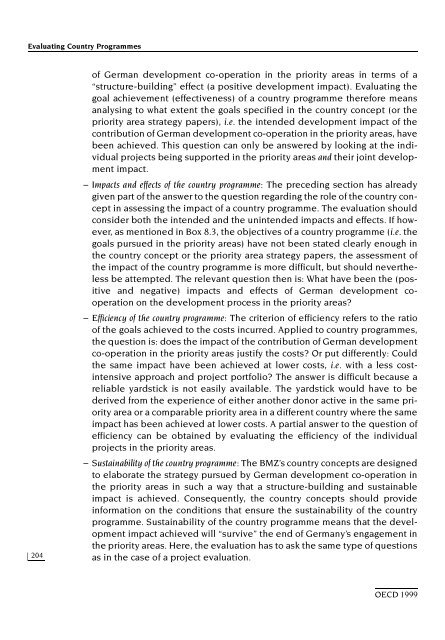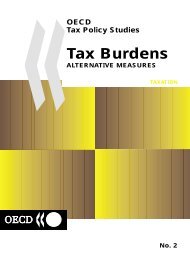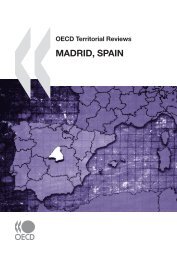Evaluating Country Programmes - OECD Online Bookshop
Evaluating Country Programmes - OECD Online Bookshop
Evaluating Country Programmes - OECD Online Bookshop
Create successful ePaper yourself
Turn your PDF publications into a flip-book with our unique Google optimized e-Paper software.
<strong>Evaluating</strong> <strong>Country</strong> <strong>Programmes</strong><br />
204<br />
of German development co-operation in the priority areas in terms of a<br />
“structure-building” effect (a positive development impact). <strong>Evaluating</strong> the<br />
goal achievement (effectiveness) of a country programme therefore means<br />
analysing to what extent the goals specified in the country concept (or the<br />
priority area strategy papers), i.e. the intended development impact of the<br />
contribution of German development co-operation in the priority areas, have<br />
been achieved. This question can only be answered by looking at the individual<br />
projects being supported in the priority areas and their joint development<br />
impact.<br />
– Impacts and effects of the country programme: The preceding section has already<br />
given part of the answer to the question regarding the role of the country concept<br />
in assessing the impact of a country programme. The evaluation should<br />
consider both the intended and the unintended impacts and effects. If however,<br />
as mentioned in Box 8.3, the objectives of a country programme (i.e. the<br />
goals pursued in the priority areas) have not been stated clearly enough in<br />
the country concept or the priority area strategy papers, the assessment of<br />
the impact of the country programme is more difficult, but should nevertheless<br />
be attempted. The relevant question then is: What have been the (positive<br />
and negative) impacts and effects of German development cooperation<br />
on the development process in the priority areas?<br />
– Efficiency of the country programme: The criterion of efficiency refers to the ratio<br />
of the goals achieved to the costs incurred. Applied to country programmes,<br />
the question is: does the impact of the contribution of German development<br />
co-operation in the priority areas justify the costs? Or put differently: Could<br />
the same impact have been achieved at lower costs, i.e. with a less costintensive<br />
approach and project portfolio? The answer is difficult because a<br />
reliable yardstick is not easily available. The yardstick would have to be<br />
derived from the experience of either another donor active in the same priority<br />
area or a comparable priority area in a different country where the same<br />
impact has been achieved at lower costs. A partial answer to the question of<br />
efficiency can be obtained by evaluating the efficiency of the individual<br />
projects in the priority areas.<br />
– Sustainability of the country programme: The BMZ’s country concepts are designed<br />
to elaborate the strategy pursued by German development co-operation in<br />
the priority areas in such a way that a structure-building and sustainable<br />
impact is achieved. Consequently, the country concepts should provide<br />
information on the conditions that ensure the sustainability of the country<br />
programme. Sustainability of the country programme means that the development<br />
impact achieved will “survive” the end of Germany’s engagement in<br />
the priority areas. Here, the evaluation has to ask the same type of questions<br />
as in the case of a project evaluation.<br />
<strong>OECD</strong> 1999

















![CQE=U]^\]Z: KAZAKHSTAN - OECD Online Bookshop](https://img.yumpu.com/3915768/1/190x253/cqeuz-kazakhstan-oecd-online-bookshop.jpg?quality=85)